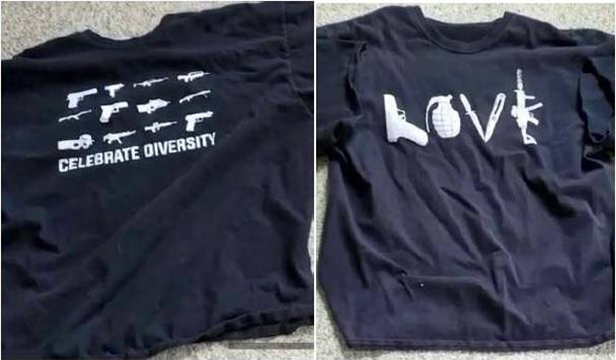November 14, 2018
Judge Sides With Teen Suing School Principal Over Firearms T-Shirts
U.S. District Judge Lynn Adelman granted a preliminary injunction that allows the teen to wear several shirts with imprinted images of guns, rifles and other weaponry to school.

Source: Matthew Schoenecker
A federal judge has sided with a Wisconsin teen in an interesting case involving First and Second Amendment rights and imprinted T-Shirts depicting firearms.
In April, Matthew Schoenecker sued his high school principal, John Koopman, after the education administrator prohibited him from wearing tees with printed images of rifles, guns, knives and a grenade, as well as pro Second Amendment messaging, at Markesan High School.
Matthew Schoenecker, a freshman at Markesan High School in Wisconsin, is suing the school district because he believes the T-shirt ban by his principal infringes on his First Amendment free speech right to support the Second Amendment. https://t.co/iz7lslJIcl
— 🇺🇸 Jack Ralph 🇺🇸 (@NevadaJack2) April 16, 2018
Schoenecker – a sport target shooting enthusiast and ardent Second Amendment supporter – alleged in the lawsuit that Koopman was violating his First Amendment rights to freedom of expression.
On Friday, a judge agreed with the teen. U.S. District Judge Lynn Adelman ruled that Schoenecker would likely prevail in his First Amendment case. As such, Adelman granted a preliminary injunction that opens the door for Schoenecker to wear his shirts to school while the lawsuit plays out. The judge also rejected Koopman’s motion to dismiss the teen’s lawsuit. “Even short deprivations of First Amendment rights constitute irreparable harm,” Adelman opined in his order.
Certainly, Schoenecker had his supporters beyond Adelman -- some from the earliest days of his lawsuit.
"Markesan High School freshman Matthew Schoenecker"...let the HS know this is unacceptable #2A #Patriot https://t.co/yuTYS3dlrk
— PatriotMom (@Lifeizgud46) April 18, 2018
I stand with Matthew Schoenecker from Wisconsin. We need more teenagers like him. #2ndARights #FreedomifSpeech
— Alden J. Smith (@Charlie43) April 25, 2018
Three imprinted shirts that Schoenecker wore are at the center of the controversy. One shirt reads “Celebrate Diversity” on the front and features graphics of a variety of firearms. The other reads “Love,” with the letters stylized as firearms and other weapons. The “L” is a handgun, the “O” a grenade, the “V” two knives, and the “E” a rifle. A third tee consists of text that reads, “IF GUNS KILL PEOPLE, I GUESS PENS misspell words, CARS make people drive drunk, and SPOONS make people fat.”
Schoenecker said he wears the tees to show his support for the Second Amendment. Adelman picked up on that point in his decision, particularly as it related to the “If GUNS KILL PEOPLE” tee. The judge ruled that the shirt’s message echoes arguments frequently made by advocates in support of gun rights. “When (Schoenecker) wears the shirt, the plaintiff expresses his personal belief on a matter of public concern,” Adelman wrote. “Expressing that belief is protected by the First Amendment.”
Adelman also rejected arguments from the school that the shirts showing the weapons are ambiguous and thus unprotected under the First Amendment. Being open to interpretation doesn’t strip the tees of expression protection, Adelman said.
Among other findings, Adelman ruled that nothing in the record shows that Schoenecker’s shirts caused substantial disruption at Markesan High School. Had they done so, or if it was reasonable to suspect that they would, then the shirts could be censored. But that wasn’t the case, Adelman found. Court documents indicate that Schoenecker has never made violent comments or engaged in threatening actions at Markesan High School.
For a full breakdown of Adelman’s ruling, head here.
John Monroe, a Georgia-based gun rights attorney, is representing Schoenecker. From the outset, Monroe argued that the representations of firearms/weapons on Schoenecker’s shirts are non-threatening and non-violent. Restricting depictions of all firearms on clothing, even when such graphics are displayed non-violently without threat, is overly broad and unconstitutional, Monroe asserted in a lawsuit. Furthermore, Koopman’s discretionary authority to decide subjectively on a case-by-case basis what clothing is “inappropriate” is unconstitutionally vague and violates Schoenecker’s rights to due process, the lawsuit argues.
Schoenecker is not seeking damages, but Monroe might ask that defendants pay his attorney fees depending on how the court battle goes.
As Counselor noted when news of Schoenecker’s lawsuit first broke in the spring, the case is a compelling example of the prominent role message T-Shirts play in society – a point of relevance for promotional products professionals. Indeed, the shirts are vehicles for expression that exert far-reaching power.
